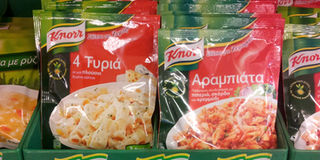Universal language is achievable

Goods with Greek inscriptions. One has to learn the language in order to know what they are used for. PHOTO BY NAFHA MAANI.
What you need to know:
Imagine yourself in a supermarket in Greece, standing in front of heaps of food products with Greek writings only, and you have no clue if this white stuff is sugar or salt!
I stood in front of an elderly Japanese man in his shop in Kyoto- Japan, I found an interesting item in his little shop and went to ask him what it was used for. He did not speak English nor did I know Japanese.
I did my best to ask him about the use of the item I was holding. He took it, nodded in appreciation and punched in the price waiting for payment. I tried once again to explain, this time in sign language, that I wanted to know how to use the item. This time he thought I wanted to have it wrapped as a gift, so he started wrapping it. At this stage I decided also to reward his excellent customer service and bought the item not even knowing what is was meant for.
This incident stuck on my mind for years; one of those moments when language did not matter. But I am afraid this is not always the case, I had some episodes of very unpleasant encounters filled with frustration. Someone in front of me refused to offer any assistance if I did not speak their language. What those people did not know was that I was as upset as they were. I wanted to know what they were talking about. And though I have made it a goal to learn as many languages as possible. After learning my fifth language and attempting to learn another two, I realised that it was rather difficult to learn all the languages in the world.
Multilinguist
However, this collection of languages that I have covers many parts of the world, or at least where I want to feel comfortable. My mother tongue is Persian or Farsi, an extremely soft and poetic language that is spoken by more than 100 million people in Iran, Afghanistan and Tajikistan. Arabic is my school language, and unlike what people think, Persian and Arabic are not the same. However, when Islam entered Iran, Arabic language made a big entrance in the language and with years they have become so intertwined that it is difficult to separate Arabic words from the Persian language.
Why I prefer certain languages
I find Arabic the most expressive and rich among the ones I know. I never failed to find expressions missing in this language. My universal language is of course, English, and I remember how excited I was while learning my first English words. My kind teacher had much influence in nourishing my love for this language.
Today, English is on top of the list of most spoken languages in the world, the internet world, games and online activities are mostly in English and we have a new generation of young people who have learnt English.
Then I learnt French which is often associated with romance but I find it a very spiritual language; I just love chanting prayers in French. And for those who think Luxembourg does not have a language, it is actually a written language, sounds Germanic and is only spoken by half a million people, and this is my fifth language. I still wish to learn Italian, and I understand that it also requires one to be skilful in using the hand movements while talking.
A language that I have no intention to learn is one that is most spoken in the world: Chinese. I know people who started learning it for business, and I still dream of world that has one universal language.




